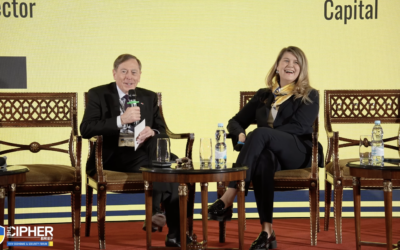
At Kyiv Summit, a Case For Investing in Wartime Ukraine
SUBSCRIBER+EXCLUSIVE INTERVIEW — While Ukraine deals with shortages of troops, munitions, and equipment for its air defenses, some Ukrainians are teaming up with foreign investors […] More
Cipher Brief Expert John McLaughlin is a distinguished practitioner in residence at the Johns Hopkins University School of Advanced International Studies. He served as the Deputy Director of the Central Intelligence Agency from 2000-2004 and Acting Director of the CIA in 2004.
OPINION — I recently returned from the annual Munich Security Conference, which for 50 years has been a gathering spot and debating forum for national security specialists, including senior government officials, from around the world. Every issue on the international agenda makes an appearance. All of this is crammed into a medium-sized, overheated, historic hotel in the old quarter of Munich. Crowds of people stream back and forth in the corridors, glancing left and right at name tags with “I must know you” expressions. Often enough you bump into a former foreign minister, a current diplomatic negotiator and yes, even old intelligence friends and foes. It’s these chance conversations that yield the greatest insights — along with what you can glean from myriad formal seminars large and small. Here are some takeaways:
U.S.-EUROPE RELATIONS
These remain somewhere between strained and muddled. Secretary of State Mike Pompeo gave a speech in which he was unrelentingly upbeat, repeatedly insisting that “we [the West] are winning,” a phrase that seemed to hit most people as reminiscent of Cold War talk. His insistence that the United States is “leading” and is committed to its allies fell pretty flat with an audience that broadly disagrees with the Trump approach to Iran and laments his withdrawal from the Paris climate agreement and his hectoring of NATO (though most Europeans acknowledge that NATO functions mainly as a deterrent).
Europeans add to the muddle with growing strain among and within countries. While Germany remains Europe’s most powerful country, and despite heroic words about playing a leadership role, most Germans I spoke with confessed to being unprepared or simply having no stomach for actually doing it given what Europe looks like these days. Britain is on its way out of the European Union, and Germany is stumbling through a wrenching political transition, moving from the era of long-serving Chancellor Angela Merkel into one of uncertainty thanks to electoral gains by a right-wing party some regard as neofascist and faltering, off-balance leftist parties. This leaves Merkel’s centrists with coalition choices so unpalatable as to induce a kind of political paralysis — and a stalled transition.
French President Emmanuel Macron spoke eloquently of a more self-sufficient Europe that he argues should be, must be, less reliant on U.S. support — but he meets skepticism elsewhere on the Continent and is weakened by protests at home. My conversations have convinced me that Europe, for at least the next year, will be preoccupied with internal issues, perhaps not unlike the U.S. We are united mainly in the sense that we both seem to be moving fitfully along what the Italians call a “bridge to the unknown.”
STRUGGLES IN THE MIDDLE EAST AND SOUTH ASIA
These showed little signs of resolution except for a thin ray of hope on Afghanistan. Sometimes optics tell you everything and that was the case at a forum involving various Persian Gulf foreign ministers in which the strains between Iran and Saudi Arabia were glaringly evident in the staging. Animosity between the two sides is such that they could not appear together and wanted their individual appearances separated by a panel of other Gulf foreign ministers and an American discussing attempts to mediate their dispute.
The American, Sen. Chris Murphy, D-Conn., did his best but was in the awkward position of being unable to defend the U.S. role, which in his view (and mine) has only contributed to tensions in the area by withdrawing last year from the Iran nuclear agreement. He argued that the accord had at least taken the nuclear issue off the table and created some space for attempts to resolve other disputes. But with the lid off the nuclear agreement, and Iran in a retaliatory posture, things have only gotten worse.
Iranian Foreign Minister Mohammad Javad Zarif claimed that Saudi Arabia had sent a message to Iran after the U.S. killed Gen. Qassem Soleimani and that Iran responded — but never heard back because Washington had pressured Saudi Arabia to drop it. Saudi Foreign Minister Prince Faisal bin Farhan al-Saud denied the interaction. The foreign ministers of Qatar, Kuwait, Oman and Turkey, meanwhile, professed to have little success with bridging efforts. I suspect there are channels working they do not talk about — but the Omani said nothing is possible until after the U.S. election.
Boil all this down and you are left with a tense and volatile stalemate. It reminds us that the distance between two points in the Middle East is never a straight line.
Talking to part of the U.S. negotiating team about Afghanistan gave me the sense that the administration’s attitude is neither optimistic nor pessimistic but, very realistically, more of a “let’s see” approach. Hope only begins if the Taliban delivers on its pledge to lower violence over a seven-day period. Then negotiations can start between the Taliban and President Ashraf Ghani’s administration. U.S. withdrawals would then be “conditions based” — the pace and magnitude tied to progress toward political agreement. No one is overselling this yet.
China also loomed large, with U.S. Defense Secretary Mark Esper arguing that Europeans would damage NATO and their relationship with the U.S. — jeopardizing their access to American intelligence — if they yielded to China’s efforts to create and equip their 5G communication networks with technology from Chinese telecom giant Huawei. It seems the case was not made, if Britain is any indication: London is letting Huawei into a portion of its networks, asserting that it can insulate its most sensitive data. Germany appears set to follow.
Many other issues were on the agenda, ranging from Russia and Ukraine to nuclear arms control, but there was no evidence of forward movement on these. The elephant in the room throughout was President Donald Trump, but he was hardly ever mentioned — including by senior officials such as Pompeo and Esper. But everyone in attendance understood that next year’s discussions would be shaped entirely by the results of November’s election.
And for global leaders worried that the U.S. may be losing its overseas focus, they will not have been reassured by this week’s Democratic presidential debate … which featured not a single question on foreign affairs.
This opinion piece by Cipher Brief Expert John McLaughlin was first published in Ozy.
Read more national security insights, opinions and analysis in The Cipher Brief.
Related Articles

SUBSCRIBER+EXCLUSIVE INTERVIEW — While Ukraine deals with shortages of troops, munitions, and equipment for its air defenses, some Ukrainians are teaming up with foreign investors […] More

SUBSCRIBER+EXCLUSIVE INTERVIEW — With a mere 1.2 million citizens, Estonia is among NATO’s smallest members, but its contributions to Ukraine have led the pack by […] More

SUBSCRIBER+EXCLUSIVE BRIEFING — Drone weapons are part of the daily narrative of the war in Ukraine – from Russia’s use of Iranian drones against infrastructure […] More

SUBSCRIBER+ EXCLUSIVE ANALYSIS — Iran’s retaliatory strikes against Israel this weekend were both a potentially game-changing, historic first — and an underwhelming response. Historic, because […] More

SUBSCRIBER+EXCLUSIVE INTERVIEW — Ukraine was hit by a fresh round of Russian missile attacks on Thursday, strikes that targeted and damaged the country’s power grid […] More

SUBSCRIBER+ EXCLUSIVE REPORTING — The Israeli drone strike that killed three adult sons (who Israel says were Hamas operatives) and four grandchildren of Hamas’s Qatar-based […] More
Search